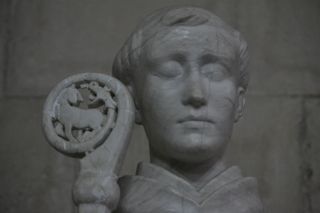I know the title of the book I am going to write! In search of austerity, travels through 12th century France and Spain. Thanks to Alex, editor of the FD magazine Persoonlijk. We’ll get by with a little help from our friends, as Ringo Star, the only not talented Beatle, sang.
Now for some context.
While in Holland I read an article from dutch journalist Joris Luyendijk about his experience as a London City journalist for two years. He was trying to understand the financial industry by writing a blog in which he wrote about talking to endless amounts of bankers. Al of them anonymously, as far as I know. It was a brilliant idea and skilfully executed. I knew how I failed as a correspondent when I saw what he was doing.
Two sentences describe his impressions from his meetings with those bankers. ‘This can not be true.’ And: ‘This can happen again any minute.’ It was awful and nothing has really changed according to Luyendijk or the people he likes to believe.
Somehow Luyendijk thinks that the crisis is caused by investment banks, or by the investment bank part of banks. They are the people that made and make tons of money, they are the ones that traded all those toxic derivatives, in those divisions greed seemed, or seems to be the only motivation.
But the real losses were made elsewhere in banks. I realized this after reading about the failure of RBS. The majority of its losses were caused by simple banking rules. Meaning when you are going to be too generous with credit, you are going to end up with some of the problems. RBS being as large as it was (is) was going to end up with lots of those problems.
With his focus on investment banks, Luyendijk dismisses the fact that the crisis, in general, is caused by a disregard of risk. The interest rate is the most adequate measurement of risk. As long as the interest rate is low, and the real interest rate (nominal rate minus inflation) is still around zero, people will behave too risky.
What does this have to do with austerity, or with the 12th century?
Well, banking is about trust. Trust is a form of belief. In the 12th century one believed the road to heaven was paved by relics and saints, in the 21st centuries the idea of a heaven after death has been traded in for a search for a heaven on earth, the new consumerism. Thankfully provided for by the benefits of the low rent mortgage (which is only possible with the help of derivatives and shortsighted credit rating agencies, activities of investment bankers, in a nutshell).
Whatever. Belief with an unreliable counterpartner is the cause of misery. That’s what happened with those gold-plated churches of the 12th century. That’s what happened with banks in the last decennium.
The only reliable and plausible solution is austerity. At least that’s what the Cistercians preached. And beauty, I might add, and stillness, maybe, and ….
To be continued.
5 nov

Share


Han says
A nice coincidence is the link between the centuries: 12th and 21st
Besides that I think there is more to say about this matter than just interest rates. Just watch the ‘Tegenlicht’ broadcast about high frequency trading, and you’ll be shocked. It’s about greed I think. And that’s an impulse not strange to the people of the 12th century also …
José says
http://tegenlicht.vpro.nl/afleveringen/2013-2014/de-wall-street-code.html
julierezac@btconnect.com says
ik kan het programma niet zien. maar ik kan me ook niet voorstellen dat het ijn mening veranderd. ik ben nu eenmaal niet van de gemakkelijke verontwaardiging. en daar valt al dit banker bashing onder. ik herinner me de tijd bij het FD, dat ik mijn collega’s vroeg of al die enorme rendementen van zakenbanken, hedge fondsen en private equity clubs gebaseerd waren op kennis of op het meezeilen in de wind. ik kon het niet bevatten. het was natuurlijk meezeilen, maar nu denk ik dat alle kritiek – ik zag jan mulder vorige week bij DWDD- en braakte (bijna), ook.